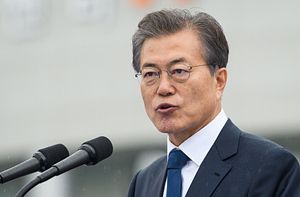With thawing relations with its northern neighbor and hopeful prospects for the Korean Peninsula’s denuclearization, the government in South Korea under President Moon Jae-in is sailing smoothly, at least externally. Internally, however, constant debates over constitutional amendments are perplexing Moon and the ruling Democratic Party of Korea (DPK).
Amending the constitution has long been a popular agenda in South Korean politics. Although previously amended nine times before, the need for further amendments surfaced as the flaws of the current constitution became evident. None of South Korea’s preceding presidents has met a happy end. Moon’s predecessor, Park Geun-hye was impeached and now faces criminal conviction and prison time. Prosecutors are now seeking the arrest of trial of Lee Myung-bak, who held office before Park, while Lee’s predecessor, Roh Moo-hyun, committed suicide amid a corruption investigation.
Many citizens and politicians blame the high incidence of corruption on the over-concentration of power in the hands of the president and the brevity of the president’s term (five years, with no chance for re-election) which saps an incumbent’s motivation to work more arduously.
In terms of constitutional amendments, the main two issues under discussion now are deciding the power structure of the presidential system and deciphering who should hold the authority to nominate the prime minister. The Liberty Korea Party (LKP) had supported changes similar to the current ruling party’s amendment proposal when previously in power (albeit under a different name). However, now that it is the opposition, the LKP argues that the proposal for a U.S.-style two-term presidential system further strengthens the president’s authority. The LKP now supports a semi-presidential system, where the president handles foreign relations and the National Assembly-elected prime minister handles domestic issues.
In response to this opposition, Moon tabled a presidential bill for constitutional amendment that represented the LKP’s positions. Moon’s DPK, however, is now concurrently preparing to table another bill, complicating the prospects for either amendment plan.
Ostensibly, it seems as if the disagreement stems from different perspectives on how to amend the constitution and South Korea’s government system. Yet the current divergence runs deeper. The DPK and LKP have been political rivals since the establishment of South Korea — and although their names have changed numerous times throughout history, their foundations have been constant. Each side has framed one another with specific political narratives. The DPK has often put the “pro-Japanese (Chinil)” label on the LKP, accusing them of treachery during the Japanese occupation, while the LKP would often use the “Red Communist (Bbalgaengyi)” label, accusing DPK members of spying for or of being advocates of North Korea.
Now, with the rapprochement of North and South Korea and the possibility of accomplishing U.S.-North Korea summit meetings, the LPK can only resort to using these long-standing labels to condemn the ruling party while opposing the DPK’s policies — sometimes without reason — in a bid to maintain support. The Liberty Party has seemingly been forced to become more extrem. Many of its supporters have abandoned the party since Park’s impeachment, leaving mostly the radicals behind; these opinions are now increasingly reflected in the LPK’s policies.
Of course, the LKP’s claims of communist sympathies within the DPK and the Blue House have some historical basis. A portion of DPK members, not to mention the current secretaries of the Blue House, were previously active members of the ‘Jusapa’ movement, which refers to advocates for North Korea’s juche ideology. Their participation in Jusapa must be seen with historical context in consideration, of course, as the brutal authoritarian rule in 1980s South Korea might have made the communist rule in the north seem more attractive than it is now. Therefore, overly questioning such members’ allegiance may be absurd in the modern context, despite the historical basis.
Fear of communism is still a prominent among a large portion of South Koreans, especially among the elderly, who have directly experienced an ideological war. Thawing relations with North Korea, therefore, is not seen favorably by this group of people, and their fears are directed against the DPK; such sentiments are further incited by the LKP for political benefit. The LKP’s opposition to the ruling party’s constitutional amendment plan (and many other policies) is not simply derived from dissimilar opinions but rather from such political considerations.
Spring seems to be coming to the Korean Peninsula, with discussions of North Korean summits with South Korea and the United States. However, South Korea’s domestic politics are still bound to the past. Regardless of any future signs of true reconciliation between the Koreas, the LKP will continue to confront the DPK using the same political frame and with eyes of distrust. In fact, the closer the two Koreas become, the more radical the LKP may get, in an attempt to legitimize their long-held anti-communist stance to their supporters.
Even though previous rounds of talks and appeasement with North Korea were met with even larger antagonism – be it new developments in North Korea’s nuclear weapons program or other provocations — South Korea has no other choice but to trust North Korea one more time. War cannot reoccur on the peninsula, as it will destroy everything the South Koreans have achieved in the past decades. Well-grounded opposition is always beneficial in any society, but the current confrontation between the DPK and the LKP seems to be coming more from political motives than practical reasoning. That polarization will mean Moon and the ruling party face increasing difficulties on internal issues even amid their apparent progress toward final reconciliation with Pyongyang.
Yaechan Lee is an M.A. candidate in International Relations at Peking University and holds a B.S. in Economics from Waseda University.
































